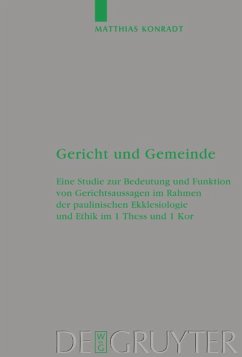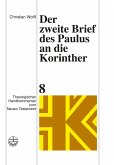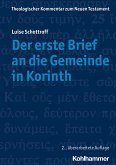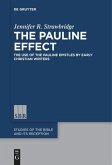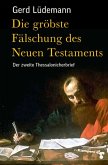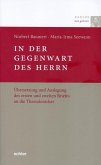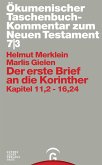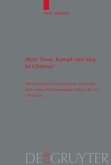The present study deals with St. Paul's statements about judgement, but instead of examining them from a single perspective in their relationship to the discourse of "justification by faith", it places them in the context of Pauline ecclesiology and ethics. It asks the concrete question of how St. Paul introduces the theme of judgement and in what contexts in order to structure community or set waymarks for Christian life. The study focuses on the First Epistle to the Thessalonians and the First Epistle to the Corinthians.
Statt die paulinischen Gerichtsaussagen allein monoperspektivisch auf ihr Verhältnis zur Rede von der "Rechtfertigung aufgrund von Glauben" hin zu befragen, stellt die vorliegende Studie die Gerichtsaussagen in den Kontext der paulinischen Ekklesiologie und Ethik hinein. Es wird konkret gefragt, wie und in welchen Zusammenhängen Paulus die Gerichtsthematik einsetzt, um Gemeinde zu gestalten oder Wegmarkierungen christlichen Wandels zu setzen. Im Zentrum der Untersuchung stehen dabei der 1. Thessalonicherbrief und der 1. Korintherbrief.
Statt die paulinischen Gerichtsaussagen allein monoperspektivisch auf ihr Verhältnis zur Rede von der "Rechtfertigung aufgrund von Glauben" hin zu befragen, stellt die vorliegende Studie die Gerichtsaussagen in den Kontext der paulinischen Ekklesiologie und Ethik hinein. Es wird konkret gefragt, wie und in welchen Zusammenhängen Paulus die Gerichtsthematik einsetzt, um Gemeinde zu gestalten oder Wegmarkierungen christlichen Wandels zu setzen. Im Zentrum der Untersuchung stehen dabei der 1. Thessalonicherbrief und der 1. Korintherbrief.
" [...] jeder, der sich mit den Texten 1Thess und 1Kor beschäftigt, erzielt großen Nutzen, wenn er diese vielseitige und solide Monographie in die Hand nimmt."
Lars Aejmelaeus in: Theologische Literaturzeitung 9/2005
"Bei der vorliegenden Arbeit handelt es sich um eine ganz ausgezeichnete Studie. [...] Der Band wird sicherlich bald einen wichtigen Platz in der Paulusexegese allgemein einnehmen und dürfte so zum Ausgangspunkt weiterer fruchtbarer Diskussionen werden."
Tobias Nicklas in: Review of Biblical Literature 2004
Lars Aejmelaeus in: Theologische Literaturzeitung 9/2005
"Bei der vorliegenden Arbeit handelt es sich um eine ganz ausgezeichnete Studie. [...] Der Band wird sicherlich bald einen wichtigen Platz in der Paulusexegese allgemein einnehmen und dürfte so zum Ausgangspunkt weiterer fruchtbarer Diskussionen werden."
Tobias Nicklas in: Review of Biblical Literature 2004

